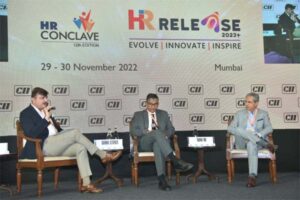- The GiG workforce will help bridge the unemployment gaps in India, but there is a need for more depth and commitment towards the business
- India is one of the fastest growing economies and has the potential to act upon the huge opportunities thrown by some of the global challenges due to its human capital
- Indian businesses are into multitasking and known for their agility
- A good leader is emphatic towards its employees and needs to put the greater good of its company at times of crises, rather than soft-pedal his employees to retain them
NE BUSINESS BUREAU
MUMBAI, NOV 30
The potential of Indian companies to help achieve Prime Minister Narendra Modi’s vision of being a $5 trillion economy and becoming Aatmanirbhar Bharat is possible with the help of its human capital.

Sanjay Behl, Chairman, CII National Committee on Leadership & HR & CEO & Executive Director, Greaves Electric Mobility during the 12th CII HR Conclave stated that the growth of any business depends on the quality of human capital that it employs. “India is one of the fastest growing economies and has the potential to act upon the huge opportunities thrown by some of the global challenges,” he said.
He explained that globally, the economic index is contracting and with countries like China fighting some of its own internal crises thus altering the geopolitical dynamics. “India can benefit by increasing its market share. It needs a new play book to seize the plethora of opportunities that has come,” he pointed out.
The COVID 19 pandemic has helped companies reshape their business models and this has led to a lot of geographic diversity in its workforce which is a huge opportunity to attract talent, stated Sudhir Sitapati, Managing Director, and CEO, Godrej Consumer Products Ltd at the 12th CII HR Conclave – ‘HR RELEASE 2023- Evolve | Innovate | Inspire’ organised by the Confederation of Indian Industry (CII).
Sitapati stated that due to the geographic diversity of the workforce, talent from countries like UK and Singapore are working for Indian companies which is a huge opportunity today to bridge the talent gap. “The GIG workforce is certainly a great way of working and would help in bridging the employment gaps as well, but there is a need for more commitment and depth towards the businesses,” he said.
He also stated that companies take years to develop a culture around their workforce and that defines the way that businesses are conducted. “The role of the mentors and the human resource team of such companies is to be more emphatic towards the workforce. That is how talent is retained,” he added.
Sitapati stated business leaders at times of crises need to focus on getting the things done in hand, and not soft-pedal its employees to retain them. “From being empathic to communicating clearly, the leader needs to put the greater good of its company at times of crises,” he pointed out.
Tarun Rai, Executive Director, Wunderman Thompson explained that the people- asset should be looked upon as the most valuable asset in any company. “Instead of expecting employees to be loyal to the company, the companies need to be loyal to their workforce and give them an opportunity to grow. The employees can be loyal to their own careers,” he said.
According to Rai, post the pandemic, companies are looking at boosting their performance matrix and hybrid models of work. “The plan was already there for many companies; the pandemic just accelerated these models for them. It has only made us test out the technology and embrace change,” he explained.
He added that with the changing working culture, companies need to come out with new ways of measuring people productivity. “If the company looks at nurturing its human talent and gives them ample opportunity to grow then issues such as moonlighting do not arise,” he added.
Rai also informed that Indians by nature are into multitasking and known for their agility. “That is when we can get global concepts to become fully operational from India,” he said.












